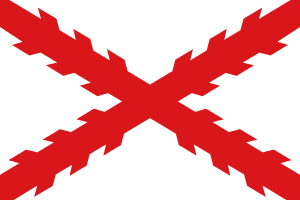Diego de los Ríos
| The Most Excellent Diego de los Ríos OCIII OIC | |
|---|---|
.jpg) | |
| 116th Governor-General of the Philippines | |
|
In office September 1898 – December 10, 1898 | |
| Monarch | Alfonso XIII of Spain |
| Preceded by | Francisco Rizzo |
| Succeeded by | Elwell Stephen Otis as Military Governor of the Philippines |
| Personal details | |
| Born |
April 9, 1850 Guadalajara, Spain |
| Died |
November 4, 1911 (aged 61) Madrid, Spain |
| Spouse(s) | Matilde Sáenz de Santa María y Torres |
Diego de los Ríos y Nicolau (9 April 1850 – 4 November 1911) was the last Spanish Governor-General of the Philippines.
Governor-General of the Philippines
Governmen in Iloilo
In September 1898, he became the Governor-General of the Philippines during the Spanish–American War after the United States of America took control of Manila after the 1898 Battle of Manila. The capital of the Spanish Philippines was at that time in Iloilo. While fighting with the Americans was over, the Spanish authorities continued to fight the forces of the Philippine Revolution for control of the country outside of Manila and Manila Bay
Desiring to save the Visayas and Mindanao from being conquered by Philippine revolutionary forces, de los Rios asked Spain to grant some reforms demanded by citizens of Iloilo. He issued in Iloilo a proclamation to the people of the Visayas calling on them to establish a "Council of Reforms" to be made up of 24 leading citizens, 12 of whom would be selected by popular vote and another 12 to be appointed by the governor-general himself. The granted reforms, however, satisfied only a few ilustrado leaders and the Philippine revolution in Iloilo heated up.
The general uprising against the Spanish authorities on Panay, particularly in Iloilo, took place on October 28, 1898. On that day onward, the interior towns of the province of Iloilo were liberated from Spanish control. By the first week of November, only Jaro, Molo, and Iloilo remained in the hands of the Spaniards. On November 21, Jaro was delivered by the Spanish government to the Ilonggo revolutionary forces.
His term as Governor-General of the Philippines legally ended on December 10, 1898 when the Treaty of Paris was signed transferring soveriegnity of the Philippines from the Spanish Empire to the United States of America. The Philippine Revolution however continued, and would become the Philippine-American War early in 1899.
With the Spanish army being besieged by the revolutionary troops in the positions which they held in Iloilo and Molo, and being threatened by a decisive attack, the Spanish government under De los Rios eventually opened up negotiations with the Ilonggos. The outcome of the negotiations was the evacuation of Molo and Iloilo City by the Spanish troops and their subsequent surrender to the native forces under the command of Gen. Martin Delgado at Plaza Alfonso XII (now Plaza Libertad) on December 23, 1898.[1]:511 He left Iloilo to transfer his capital to Real Fuerza de Nuestra Señora La Virgen del Pilar de Zaragoza in Zamboanga bringing with him the remnants of his colonial forces in the Visayas on the eve of the surrender of the Spanish forces in Visayas to the Ilonggo revolutionaries in December 24, 1898.
In Zamboanga
The Governor-General upon his arrival at Fort Pilar on December 24, 1898 immediately made preparations for the defense against the Philippine revolutionaries. He brought the colonial forces from Cotabato and Lanao and consolidated them all at Fort Pilar. The Governor-General of Mindanao Island, General Jaramillo, transferred his command to General Montero, ex-governor of Cebu, and left for Manila with General Rios in Dec. 1898.[1]:530
In Manila
General Diego de los Rios brought his troops to Manila in January 1899, before the troops' departure to Spain.[1]:539 The general remained in Manila until 3 June 1899, trying to secure the release of Spanish prisoners from the rebels.[1]:540 General Nicola Jaramillo then took over negotiations.[1]:540
References
External links
- El general Ríos: notas biográficas. ABC. 13 November 191. p.13
| Political offices | ||
|---|---|---|
| Preceded by Francisco Rizzo (Government in Manila) |
Governor-General of the Philippines (Government in Iloilo) August 13 – December 10, 1898 |
Succeeded by Post abolished Emilio Aguinaldo - Philippine President (República Filipina) and Wesley Merritt - Military Governor of the Philippines (United States) |

.svg.png)